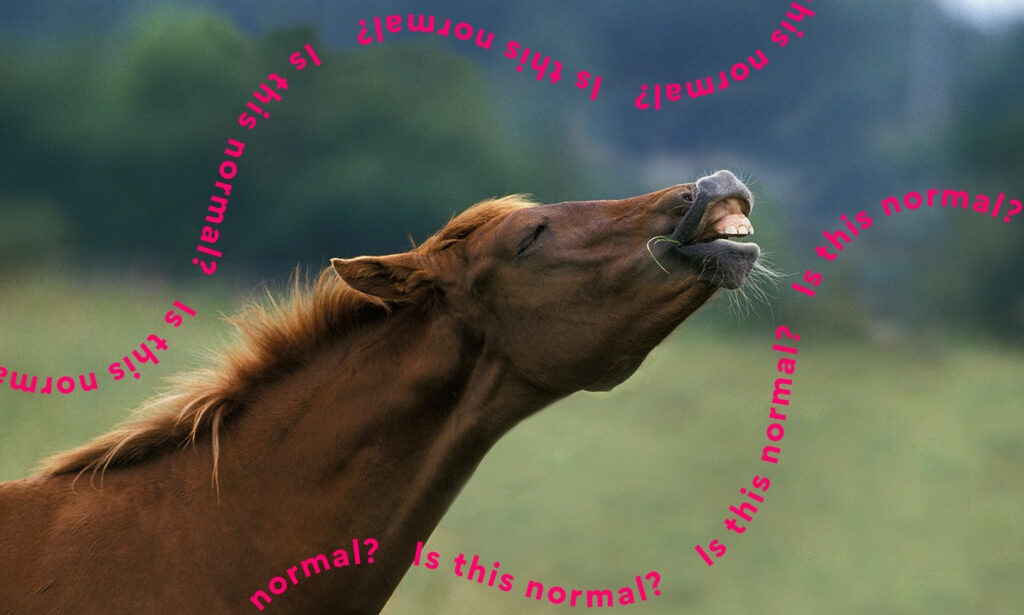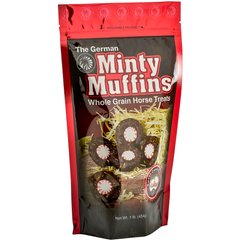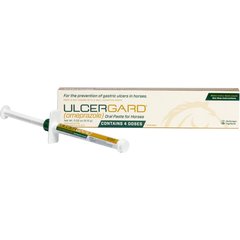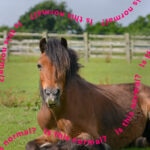I Caught My Horse Smiling—Is This Normal?

Photo by Chewy
Q: I think I just caught my horse smiling! I saw him lift his upper lip and show his front teeth. Then he stuck his nose up in the air, like a person throwing their head back and laughing. Is a smiling horse normal? Why do horses smile?
A: This is completely normal, but the behavior you described is not a “smile.” It’s actually called the Flehmen response. Rather than a facial expression conveying a feeling or need, it’s an automatic reaction to certain smells.
Horses do use facial expressions and body language to communicate happiness and other feelings—just not by pulling back their lips and showing their teeth.
To learn more about how horses express themselves, we talked to researcher and animal behavior textbook author Katherine Houpt, VMD, PhD, professor emeritus in behavior medicine at Cornell University in Ithaca, New York; as well as practicing large animal veterinarian Merle DerVartanian, DVM, of Conejo Valley Equine in Thousand Oaks, California.
Can Horses Smile?
Horses do not smile—at least, not in the way humans and some other primates do.
“I don’t think there is a horse equivalent to a smile,” says Dr. DerVartanian. “Just a happy attitude toward you. Outgoing, ears pricked forward, nuzzling you.”
Still, your horse’s face can tell you a lot about how they’re feeling. Studies show that horses display 17 different facial movements, such as pulling their lips upward, partially blinking their eyes, or tightening their chin muscles. When these different movements are combined with the many possible positions of a horse’s ears, each horse has the potential to make hundreds of different facial expressions.
“A horse baring his teeth may be showing aggression. If he is lifting his upper lip while drawing air in, he is displaying the Flehmen response to an odor. He might be reacting to your cologne, not to you,” says Dr. Houpt.
Another study found that 100% of horses made facial micro-expressions, or fleeting changes in the face caused by brief contractions of the facial muscles. That’s something they share with humans. Picture a person’s eyes darting away from you for a split second or a smile flitting across someone’s lips. While horses’ faces work differently from humans’, these subtle shifts can still convey emotion.
Behaviorists are working on helping humans better understand horses’ facial expressions. For example, one group of researchers developed an ethogram (an assessment based on observed behaviors) that can determine whether a ridden horse is in pain.
Why Do Horses Smile?
Equine behaviors interpreted as “horse smiling” by humans are not related to feelings of happiness, but they might still be important signals.
Here are the most common reasons your horse might appear to be “smiling,” according to experts.
They Just Smelled Something Interesting
As Dr. Houpt mentioned, lifting just the upper lip is a sensory reaction called the Flehmen response.
The Flehmen response helps a horse draw scent particles into a special part of the nose called the vomeronasal organ, which sends signals to the brain areas tied to social and mating behavior, explains Dr. Houpt. Afterward, you might notice your horse’s nose running—this helps flush out anything they pulled into that organ.
Stallions use the Flehmen response to determine whether a mare is in heat. But it’s not just for breeding animals; any strong or unusual smell can trigger this reaction.
“All horses can do it, but male horses do it more than females,” says Dr. Houpt.
The Flehmen response is a good thing—it means your horse is exploring their environment and using their senses normally. You don’t need to take any action in response, other than maybe snapping a quick selfie with them while they’re making a funny face!
If you want to see your horse perform the Flehmen response, try a peppermint treat, like Equus Magnificus Minty Muffins. Many horses exhibit a Flehmen response to minty flavors.
Recommended Product
They Need To See an Equine Dentist
If your horse appears to be constantly smiling by parting their lips at the front of their mouth, that could indicate a dental problem.
“I did once have a client tell me their horse was smiling at me. He had EOTRH [equine odontoclastic tooth resorption and hypercementosis], a painful dental condition where tooth roots get bigger and bigger, and couldn’t close his lips,” Dr. DerVartanian recalls.
Any horse diagnosed with EOTRH is typically treated by extracting (removing) the diseased teeth. The good news is, they recover well after dental surgery and are much more comfortable.
This condition affects the front incisors, not the teeth used for chewing. So, they won’t even need a special diet.
“They can do everything other horses do with just their lips, even graze. They may have trouble keeping their tongues in their mouths, but it doesn’t seem to bother them!” says Dr. DerVartanian.
They’re in Pain and Need the Vet
A “smiling” expression consisting of pulling the upper and lower lips rigidly away from the teeth could indicate discomfort or stress—in other words, it’s more of a grimace.
“Be concerned if they are doing it for a long time while not eating,” says Dr. DerVartanian. “Usually horses I see doing this are also stretching as if they want to urinate, but they’re really just showing abdominal pain.”
Abdominal pain is a symptom of colic and always warrants a call to your veterinarian. It could also be a sign of gastric ulcers. If your horse is diagnosed with ulcers, your veterinarian might prescribe omeprazole paste.
Recommended Product
It’s a Trained Behavior
Some people like to train horses to “smile,” usually by tickling the horse’s upper lip or exposing them to a strange smell until they display the Flehmen response, then rewarding them with food.
If your horse frequently lifts their upper lip without smelling something unusual, then looks expectantly at you for a treat, a previous handler might have taught them this trick.
If you like it, feel free to pair it with a cue of your choice and keep rewarding the behavior when performed on cue. If you’d prefer to see the behavior stop, you can extinguish the behavior simply by ignoring it.
Either way, it’s just one more reminder that horses—and their humans—are always learning from each other.
FAQs About Horse Smiling
Q: Can horses actually smile?
A: Horses display complex facial expressions, but they don’t smile. Happy horses’ faces tend to be soft and relaxed, with no tension in the lips.
Q: Why do horses smile with teeth?
A: A horse showing their teeth could be guarding a resource (such as food), displaying the Flehmen response to learn more about an odor, or even expressing pain. If you’re not sure which of these your horse is doing, check in with your equine veterinarian or behaviorist.
Q: Is my horse smiling because they’re happy?
A: No, horses express happiness and relaxation in other ways, such as by bringing their ears forward and nickering when a favorite human—or someone carrying food—approaches. Any expression that looks like a “smile” either means something else or is a trained behavior.
Attributions
This content was medically reviewed by Courtnee Morton, DVM, Chewy veterinarian.





